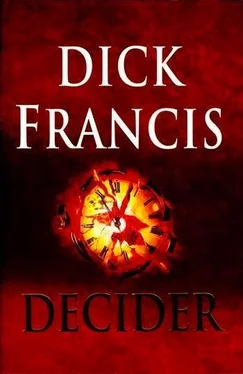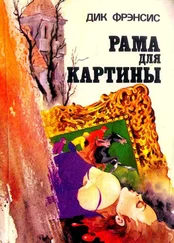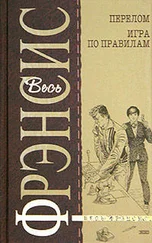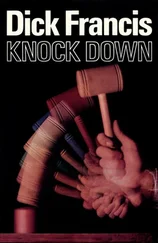‘But you didn’t.’
‘I’m not daft .’
‘Not far off it,’ Henry told him.
‘Where do I get petrol?’ Quest asked rhetorically. ‘Buy a can from a garage, buy five gallons of petrol, then burn a fence down? I ask you! He took me for daft.’
‘Eating a hamburger was daft,’ Henry said.
‘Do you still have the paper with the instructions?’ I asked.
‘The paper said to burn the instructions.’
‘And you did?’
He nodded. ‘Of course.’
‘Silly,’ I said. ‘You’re not much of a villain. Who’s going to believe you, without those instructions?’
‘But,’ he spluttered, ‘I mean, but...’
‘How did you actually do it?’ I asked, ‘I mean, how did you position the firelighters?’
He said matter of factly, ‘I pushed them into the fence in bunches. Then I lit a roll of newspaper and went along lighting the bunches all at once.’ He almost smiled, ‘It was easy.’
He should have burned the wrappers as well, I thought, but then people were fools, especially actors who weren’t practised criminals.
‘I think,’ I said to Roger and Henry and Oliver, ‘that we might do a spot of Strattoning here.’
‘How do you mean, exactly?’
‘Could I borrow your typewriter?’
‘Of course,’ Roger said, pointing to the inner office. ‘In there.’
I went through to the machine, switched on the electricity and typed a short statement:
I, Harold Quest, actor, agreed that in return for money I would mount nuisance demonstrations at the main gates of Stratton Park racecourse, ostensibly but not actually in support of a movement to discredit the sport of steeplechasing. For this service I received payments on several occasions from a man driving a silver Jaguar XJ6, registration number as follows, To comply with instructions received from this driver I also bought one hundred ‘Sure Fire’ firelighters and, using them, burned to the ground the birch fence at the open ditch in the straight, at approximately six a.m. Monday, Easter Bank Holiday.
Roger, Oliver and Henry read it and presented it to Quest for signing. He was predictably reluctant. We told him to add the date and his address.
‘You might as well,’ I said, when he shrank from it, ‘as you’re in the phone book and we can find you any time, I should think, if your photo’s in Spotlight with the name of your agent.’
‘But this is an admission of guilt,’ he protested, not disputing our ability to track him down, as one could with any actor, through their professional publication.
‘Of course,’ I said, ‘but if you sign it, you can buzz off now, at once, and use your return bus ticket, and with luck we won’t give your confession to the police.’
Quest searched our faces, not finding much to reassure or comfort him; but he did sign the paper. He did, in his own handwriting, fill in the car registration (verified by Roger), and also his address and the date.
The others scrutinised the pages.
‘Is that everything?’ Roger asked me.
‘I’d think so.’
Roger said to Henry, ‘Let him go,’ and Henry opened the office door to freedom and jerked his thumb in that direction, giving Quest a last order, ‘Out!’
Quest, an amalgam of relief and anxiety, didn’t wait for a change of heart on our part but took himself off at the double.
Henry looked at the abandoned bits of hamburger and said disgustedly, ‘We should have rubbed the little shit’s nose in that mustard.’
I said with mock seriousness, ‘Quest’s not all bad. Remember, he did call Rebecca “ducky”.’
Henry guffawed. ‘So he did.’
Roger picked up the signed confession. ‘What do we do with this, then? Do we, in fact, give it to the police?’
‘No,’ I said, ‘we give it to Marjorie Binsham.’
Notwithstanding our threats to Quest, the police presence behind the partitioning wall had by that morning fallen to two constables, both there more to prevent the public from entering and hurting themselves in the unstable building than to investigate further for evidence.
As far as Roger and Oliver had been able to discover the previous afternoon, after I’d left, the higher ranks and the bomb expert had completed their work with the discovery and reassembling of a blown-apart clock face, and had said their further enquiries would be conducted ‘elsewhere’, unspecified.
‘They don’t know who did it,’ Roger baldly interpreted.
In front of the boring and forbidding partition fence there now rose an inflated Sleeping Beauty’s Bouncing Castle, complete with fairytale towers and a child-minder in the shape of Henry’s one remaining maintenance man.
Ivan, in a flush of generosity, had returned with a second vanload of (free) plants, this time young bushy trees in pots, which he spread out on each side of the castle, making the fence in consequence a tamer, even decorative, part of the scenery.
By the time Roger drove us toward his house at eleven-thirty, neither he nor I nor Henry could think of any improvements that could be managed in time for that afternoon, though many that could be achieved afterwards, before the next meeting.
The boys changed into tidy clothes with only medium grumbles. I changed from navvy to gentleman and with my walking stick clumsily managed to knock to the floor the pile of Carteret’s diaries that had been on the table by my bed. Edward obligingly picked them up for me, but held one awkwardly open, its pages tearing halfway along from the spiral wire binding.
‘Hey, careful!’ I said, taking it from him. ‘You’ll get me shot.’
I concentrated on closing the book to minimise the damage, and there, leaping out at me from the page, was the name I’d sought for unsuccessfully on the train.
Wilson Yarrow.
‘Wilson Yarrow,’ Carteret had written, ‘that paragon we’ve had stuffed down our throats, they say he’s a fraud!’
The next paragraph didn’t explain anything but merely consisted of remarks about a lecture on miniaturisation of space.
I groaned. ‘They says he’s a fraud’ got me no further. I flicked forward a few pages and came to:
There’s a rumour going round that Wilson Yarrow won the Epsilon Prize last year with a design he pinched from someone else! Red faces on the staff! They’re refusing to discuss it, but perhaps we’ll hear less about the brilliant Wilson Yarrow from now on.
The Epsilon Prize, I remotely remembered, had been given each year for the most innovative design of a building by a senior student. I hadn’t won it. Nor had Carteret. I couldn’t remember ever having submitted an entry.
Roger banged on the bus door, stuck his head in and said, ‘Ready?’ and the Morris family, dressed to impress, trooped out for his inspection.
‘Very good,’ he approved. He gave us all racecards, entry badges and lunch tickets out of an attaché case.
‘I don’t want to go to the races,’ Toby said, suddenly frowning. ‘I want to stay here and watch football.’
Roger left the decision to me.
‘OK,’ I said to my son peaceably. ‘Get yourself some lunch, and if you change your mind, walk up later to the office.’
Toby’s worried frown turned to a more carefree expression. ‘Thanks, Dad,’ he said.
‘Will he be all right by himself?’ Roger asked, driving away with the rest of us, and Edward assured him, ‘Tobe likes being by himself. He hides from us often.’
‘He goes off on bike rides,’ Christopher said.
Roger’s mind switched to the day ahead. ‘We’ve done all we could,’ he said dubiously.
‘Don’t worry so much,’ I told him. ‘Do you know a rabbet from a raceway?’
Читать дальше




